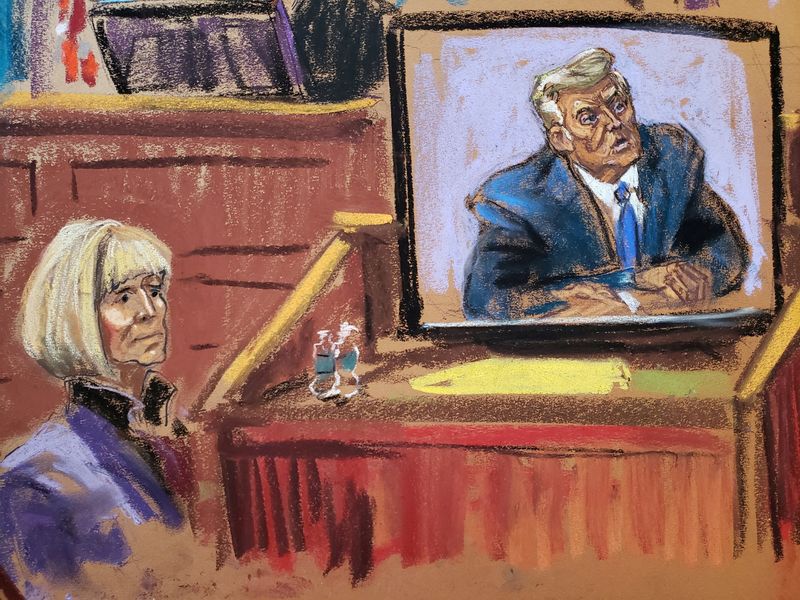By Jack Queen
(Reuters) - A jury in Manhattan decided on Tuesday that former U.S. President Donald Trump must pay $5 million in damages for sexually abusing magazine writer E. Jean Carroll in the 1990s and then defaming her by branding her a liar.
Here is a rundown of what could come next:
WILL TRUMP WILL APPEAL THE VERDICT?
Yes. Trump’s lawyer Joe Tacopina said he will challenge what he said were unfair rulings by U.S. District Judge Lewis Kaplan.
To prevail, Trump would have to show Kaplan incorrectly applied the law in various rulings and that this deprived him of a fair trial.
Tacopina told reporters that the issues on appeal will include Kaplan’s decision to allow jurors to hear the “Access Hollywood” tape, where Trump was recorded talking about grabbing women's genitals without their consent. Jurors also saw footage of Trump defending those remarks in a deposition.
Experts said Trump does not appear to have a strong appeal case, noting Kaplan's experience and that quality lawyering on both sides appeared to have ensured a fair trial.
Carroll's lawyer Roberta Kaplan, who is not related to Judge Kaplan, said on ABC's "Good Morning America" Wednesday that Trump had "absolute zero" chance on appeal because the judge went out of his way to ensure proceedings were handled fairly.
CAN TRUMP PAY THE $5 MILLION?
Probably. In addition to his Mar-a-Lago resort in Florida, Trump owns the Trump National Doral Miami and a dozen other golf courses in the U.S., Scotland and Ireland.
Trump could not use campaign funds to pay, but he could seek to crowdfund it from supporters who believe his claims that the case was a hoax orchestrated by political opponents.
Trump supporters have eagerly donated to his causes in the past. During his presidency, they gave more than $25 million to a crowdfunding campaign organized by former Trump advisor Steve Bannon to support the construction of a wall on the Mexican border.
WILL TRUMP PAY AND WHAT HAPPENS IF HE DOESN’T?
Trump remained defiant after the verdict, saying he never met Carroll and doubling down on his claim that the case is aimed at preventing him retaking the White House in 2024.
He has paid to end lawsuits while denying the allegations against him in the past. In 2018, he paid $25 million to students at his now-defunct Trump University who alleged they were lured into paying thousands of dollars for sham business seminars. He did not admit any wrongdoing under the agreement.
Trump will likely obtain a court order stating that he does not have to pay Carroll while his appeal is pending.
Ultimately, Carroll and her lawyers have a variety of legal options if Trump refuses to pay, including asking a court to put liens on his property or garnish other sources of income.
Carroll said during an appearance on CNN Wednesday that the case "is not about the money" but rather to "get my name back."
WILL THIS AFFECT TRUMP POLITICALLY?
That is not yet clear, but some political strategists said the impact would likely be insignificant.
Trump got a boost in polls of prospective Republican primary voters when Manhattan prosecutors indicted him for allegedly falsifying business records related to hush money payments he allegedly made to a porn star to keep her quiet about their purported affair.
Trump's campaign reported raising $14.5 million during the first three months of this year, with contributions accelerating sharply after he announced he was about to be criminally indicted in mid-March.
But some strategists speculated that the verdict could hurt Trump with college-educated suburban women, a key demographic.
HOW LONG WOULD AN APPEAL TAKE?
An appeal could be resolved quickly, but federal appellate courts sometimes take a year or longer to hand down decisions.
Carroll has another pending defamation lawsuit against Trump that has been bogged down in appeals since she filed it in 2020, though it involves a unique legal question.
Carroll only accused Trump of defamation in that case because the statute of limitations for her sexual assault claim had expired. She filed her second suit in 2022 after New York passed a law allowing plaintiffs to sue for sexual assault claims when the window to do so would have otherwise passed.
A federal appeals court reversed a ruling by Kaplan in that case earlier this year and sent it back to him to decide whether a law shielding government employees from defamation claims applies.
WHAT OTHER LEGAL ISSUES DOES TRUMP FACE?

In addition to the hush money case in Manhattan, Trump faces two criminal investigations overseen by a U.S. Justice Department special counsel into his keeping classified documents after leaving office and his efforts to overturn his 2020 election loss. He also faces a criminal investigation by a county prosecutor in Georgia relating to his efforts to undo his 2020 election loss in that state.
Trump has denied wrongdoing in all those matters and has called himself the victim of a politically-motivated witch hunt.